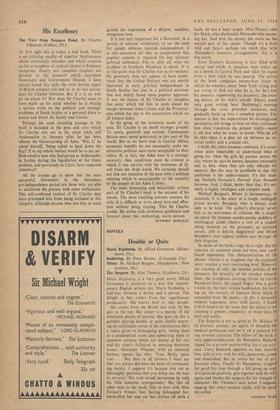NOVELS
Double or Quits
The Surgeon. By Alan Thomas. (Gollancz, 21s.)
Marie Beginning is a very good .novel. Alfred Grossman is inventive in a way few contem- porary English writers are. Marie Svobodna is half-way between a device and a person. The delight in her comes from her superhuman perspicacity. She knows how to take people.
She comes from the Bronx and rises till she gets to the top. Her career is a parody of the American dream of success. She goes up like a gambler playing double or quits, finally marry- ing the millionaire owner of the organisation. He's a sadist given to kidnapping girls, taking them to a sound-proof room and submitting them to nameless tortures which are hinted at for our and his sister's titillation in amusing decorous scenes. Alexander Wheeler, with an inherited fortune, speaks like this•: 'True, Molly, quite true. . . . But then in all fairness I must say that you always did have the habit of command- ing loyalty. I suppose it's because yob are so thoroughly patrician that you bring out the best in servants.' His wild sexual perversion he calls his 'little domestic arrangements.' He, like all other men in the book, falls in love with Miss Ferucci's breasts, but, having kidnapped her, handcuffed her and cut her clothes off with a knife, be has a heart attack. Miss Ferucci calls for Marie, who blackmails Alexander into marry- ing her. And with his money she starts on the second part of her career. Though it's a little wild and there's perhaps too much play with Alexander's 'domestic arrangements,' this is a fine novel.
Evan Hunter's Buddwing is also filled with energy and relish. A nameless man wakes up on a bench in Central Park and takes his name from a beer truck he sees passing. The action of the book comprises twenty-four hours in which he wanders about New York trying and not trying to find out who he is, for he's lost his memory, suppressing his discovery, the even- ing before, of his wife's suicide. There's some very good writing here. Buddwing's moving through the town provokes memories that gradually build up into a complete picture. The interest is that the expectations his disintegrated personality still brings to bear on what surrounds
• him often transform the present reality—make it tell him what he wants to know. Who he is? So that there is a play set up between an ex- ternal reality and a created one.
I think this often becomes confused. It's some- times quite impossible to understand what is going on; when the girls he pursues across the city, whom he says he knows, becomes externally real to him, when they are only vehicles for memory. But this may be justifiable in that this confusion is the subject-matter. It's like read- ing Nathalie Sarraute's Portrait d'un Honune It:corm:I. And, I think, better than that. It's cer- tainly a highly intelligent and complex book.
Michael Burgess's Mister is documentary in intention. It is the story of a tough, intelligent prison warder, Brandon, who is always cruel only to be kind. The author's character serves him as an instrument of criticism. He is scepti- cal about the humane namby-pamby peddlers of sociological cliche (there's a twit of a student doing research on the prisoners, an etiolated curate, and a doltish magistrate) and Mister Brandon's clear-sighted realism sees through all their disguises.
In terms of the book's logic he is right. But his victories of common sense are won over card- board opponents. The characterisation of the phoney villains is so weighted that the argument never reaches a very convincing level. However, the cleaning of cells, the internal politics of the prisoners, the• brutality of the warders towards them, the sycophants currying favour by licking Brandon's boots, the stupid Negro, who is given a knife by the truly vicious bOokmaker, his beat- ing up, the travesty of humane ideals which is concealed from the public—all this is presented without vagueness, often with clarity. I found it both honest (in the sense that the author is not claiming a greater complexity of mind than he has) and useful.
The Surgeon is not so good as Dr. Kildare in its prurient attempt, yet again, to blandish the medical profession and set it on a pedestal far our reverent attention. The milieu of the book is very upper-middle-class. Sir Humphrey Holland, tipped for a private secretaryship, has a car acci- dent. Larry Balneath operates on him, restores him, falls in love with his wife, glamorous, young and dissatisfied. But he resists her out of pro fessional ethics. Finally Sir Humphrey, crippled for good'this time through a fall going up steps to apolitical platform, gets together with his wife again and thanks the surgeon for his strength of character. Mr. Thomas's next novel, I suppose•. tapping that other residual cliché, will be abool the police.
ANTHONY WARII






























 Previous page
Previous page